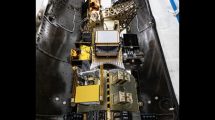
Consultant of The Torridon Group, and formerly professor at US Air Force‘s School of Advanced Air and Space Studies
John B. Sheldon, Principal and Senior Consultant of The Torridon Group outlines the benefits and roadblocks ahead for emerging space nations, in conversation with Torsten Kriening for SatellitePro ME.
When we talk about new space powers, who are we referring to?
As of 2012, there are now over 60 countries operating in space. With each passing year, more and more countries become space powers – this year alone we are seeing countries ranging from Armenia to Turkmenistan make the decision to become players in space. This activity is taking place on every continent – Africa, Latin America, all over Asia, Central and Eastern Europe, and, of course, the Middle East and North Africa.
“National pride, autonomy, national security, and in the 21st century, commercial opportunities, all play a part in why more and more countries are entering space”
What opportunities do you see from these changes? What are the implications for established space powers?
The opportunities are tremendous, certainly from a commercial perspective in terms of applying satellite applications to emerging economies, and increasing regional and global competition in this sphere. There are also challenges, of course, because not every country will have a successful space programme. Failure could result from failures in technology, technology integration, poor business models, or poor organisation and management.
“Failure will also arise because many countries are focusing exclusively on the obvious technological dimension of space, but not on the myriad policy issues and obligations that come with being a space power”
Failure will also arise because many countries are focusing exclusively on the obvious technological dimension of space, but not on the myriad policy issues and obligations that come with being a space power.
As for the implications for established space powers, well they are good and they are bad. The implications are good because emerging space powers have to learn the ropes from someone and so they turn to established space powers for that technological push and mentoring. The arrival of emerging space powers is also good for global commercial competition too, and satellite companies in established space powers are – if they are smart – taking note of this and positioning themselves accordingly.
There are also bad implications: too often I hear from policy makers in established space powers who dismiss the efforts of emerging space countries, and who cannot grasp that for these countries a presence in space is just as important to them for commercial, political, and national security purposes as it is for established powers to be in space. This is bad because one should never underestimate the potential of others, but also because it is a missed opportunity to help shape the trajectory of emerging space powers. Finally, there are bad implications if pariah states, such as North Korea, gain access to space as it will only amplify their ability to cause mischief and instability in the international community.
Will space power play an increasing economic and national security role in the 21st century?
Absolutely! In fact, I argue that the 21st century will be viewed by future historians as the age that humanity finally made the purposeful and permanent leap to the stars, and this will be possible because of the commercial pioneers out there pushing the envelope of what is considered possible. If you had told seasoned space policy analysts just a few years ago that a company like SpaceX would conduct a resupply mission to the International Space Station without a major hitch, and at a price point that is potentially profitable, you would have been met with a chorus of deep skepticism. Well, SpaceX just completed such a mission and is contracted by NASA to conduct many more. The future has only just begun!
“It is through the commercial prism that the Outer Space Treaty regime must be modified. The national security element is very important, without a doubt, but is ultimately a red-herring”
In terms of national security, again we will see profound change. Most emerging space power capabilities today are modest when compared to established space powers, but with the continuing miniaturisation of sensors and other payload technologies, thus enabling the manufacture of smaller, more capable, and cheaper satellites, as well as more competitive pricing in the launch sector, we will soon see more and more emerging space powers utilise space for national security purposes. This is profound because it will challenge the seemingly insurmountable dominance of Western militaries in this particular domain.
What drivers motivate emerging space powers to go to space and what are the challenges that emerging space powers face?
The particular motivations to enter space vary from country to country, but they are all essentially the same mix of motivations that spurred the Soviet Union and the United States to enter space back in the late 1950s. National pride, autonomy, national security, and in the 21st century, commercial opportunities, all play a part in why more and more countries are entering space. The challenges that emerging space powers face are many. The most obvious one is technological: getting to, and operating in, space is hard and will remain so for some time to come. Other challenges include generating the resources to sustain a robust and useful space programme, and those challenges involve sound policy making and implementing plausible strategies to fulfill policy aims.
A recent study suggested that for every Euro invested in space there is a four to five Euro return on that investment. That’s only true if you have a free market that can take advantage of space applications
It’s not enough to just launch something and sit back on your laurels. You need to see a return on that large investment, and that means tackling challenges like integrating space applications into every aspect of society so that it might benefit from the many advantages space has to offer. For example, in order to truly benefit commercially from space you must implement sound economic policies and reforms to enable this. A recent study suggested that for every Euro invested in space there is a four to five Euro return on that investment. That’s only true if you have a free market that can take advantage of space applications.
How do emerging space powers impact the future of international space governance and regulation?
With difficulty. While there is much to celebrate about emerging space powers, in terms of space governance and regulation I am deeply pessimistic. The reason for this is that the current international order is slowly fracturing. You name any policy topic – the global economy, international trade, climate change, and so on – and you are seeing an increasing stalemate and a growing inability to reach consensus on common problems. Why? Because there are more and more countries with individual national interests to reconcile.
For example, on global economy, issues used to be resolved via the G-5, then the G-7, quickly followed by the G-8, and now the G-20. Soon it will be the G-77!
And, sadly, with each iteration, despite grand communiques and collegial group photographs, nothing of substance can be agreed upon. Well, the same is true of space with its many challenges, such as frequency and orbital slot allocations and the really urgent matter of space debris mitigation.
Frankly, there will be no grand bargain among all the space powers on these issues. This is why sound – and by sound I mean prudent – policy making is needed on space issues in order to navigate these challenges. There will be no grand bargain, but small practical, iterative, steps that can be taken among spacefaring nations to resolve these issues, but such resolutions requires patience, education, a willingness to negotiate in good faith, and awareness of the issues as they pertain to individual state interests. I’m not convinced we are there yet.
Do the UN treaties still have the power to regulate the new issues?
The 1968 Outer Space Treaty is the only legal regime in space and will remain so for quite some time. Should it be modified? Yes, but not for the reasons that all too many diplomats think. Some believe that the regime should be strengthened by establishing a formal arms control regime in space that bans weapons that don’t even exist. This is laughable diplomacy, and entirely misses the point of 21st century space power, which is going to be dominated more by commercial interests.
It is through the commercial prism that the Outer Space Treaty regime must be modified. The national security element is very important, without a doubt, but is ultimately a red-herring.
What implications are there for industry, in both developed and emerging space powers?
There are tremendous implications for industry throughout the global satellite sector. First, we are seeing new space industries emerge in Brazil, South Korea, Singapore, and the United Arab Emirates, and other emerging powers will follow suit.
Second, new manufacturing technologies and techniques, such as additive manufacturing (also known as 3D printing), will enable these emerging industries to technologically leapfrog and catch up with industry in established space powers. Third, and finally, global supply chains will become more diversified and we will eventually see increased competition on a global scale – and that is only good for consumers.
Emerging space industries are better able to meet the needs of local and regional markets because they understand them better…countries such as Brazil, Kenya, Malaysia, Indonesia, and Australia all have the potential to become lucrative launching states
What business opportunities do emerging space power industries bring?
Emerging space industries are better able to meet the needs of local and regional markets because they understand them better. Meeting these needs, in a growing global marketplace, will lead to new innovations, especially in applications, that can be applied elsewhere around the world. There are also opportunities for space launch. Countries such as Brazil, Kenya, Malaysia, Indonesia, and Australia all have the potential to become lucrative launching states.
What military implications are there from emerging space powers?
Essentially, emerging space powers – provided that they are able to integrate space effectively into their terrestrial armed forces – will be able to benefit from space power in the same way as the United States and its allies do today.
Not every emerging space power will do this, of course, but those that do will go a long way to level the strategic playing field and will benefit from the strategic attributes that space power brings, namely: perspective, ubiquity, presence, and expanded strategic depth that extends well beyond national boundaries.
There will be no grand bargain, but small practical, iterative, steps that can be taken among spacefaring nations to resolve these issues… I’m not convinced we are there yet
How are the UAE and Qatar positioned in the space race?
The UAE is exceptionally well placed to exploit the new trends in global space race. They have the resources, the knowhow, and the national will. They also have some powerful motivations to enter space. First, space plays a big part in the drive to diversify the Emirati economy, creating highly skilled and high technology jobs, and by inference, a highly skilled and high tech workforce.
The second motivation has its roots in the strategic location and geography of the UAE, and its crucial position in the Arabian Gulf. Space power enables the UAE to take advantage of the strategic attributes of space that I mentioned previously.
 As for Qatar, it has the potential to be a major space player in the Gulf and the wider region. It also has similar motivations as the UAE.
As for Qatar, it has the potential to be a major space player in the Gulf and the wider region. It also has similar motivations as the UAE.
Interview conducted by Torsten Kriening, a business development consultant with an Executive MBA in space business and management from ISU, Strasbourg, France. Email: torsten@spaceroad.org












Add Comment